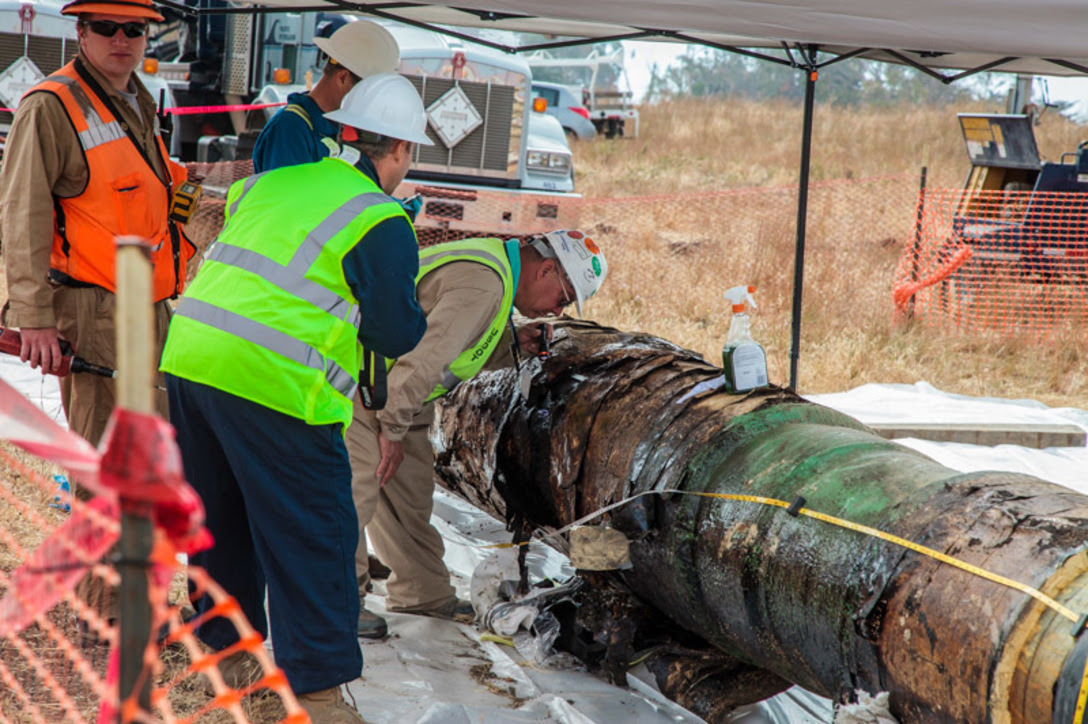The question of installing safety valves on the pipeline that caused the Refugio Oil Spill in 2015 arrives at the Board of Supervisors hearing room this coming Tuesday, August 22. What seems like a painless decision to limit the oil spilled from a rupture — especially for Supervisor Das Williams, who authored the law requiring the valves — was heard previously by the Planning Commission, which decided that automatic shutoff valves would inevitably lead to crude oil again flowing along the coast and voted them down.
The missing part of the puzzle during the Planning Commission’s hearing in April was the present state of the pipeline, though opponents charged extensive corrosion was likely and no repairs were made except to the obvious rupture. In answer, Exxon’s attorney stated the pipeline was holding pressure without leaks.
After the 2015 spill, investigators had found that water had seeped under the insulation around the steel pipe and corroded the metal to the breaking point. Plains All American Pipeline was found guilty of criminal negligence in the Refugio spill in part because its pipeline tests had failed to detect the corrosion that caused the spill. The pipeline has been moribund since the 2015 oil spill; however, with the transfer of ownership of the pipeline from Plains to ExxonMobil in October 2022, any reports about repairs or maintenance of Line 901 are made to the federal pipeline authority and to the Office of the State Fire Marshal, not to the County of Santa Barbara.
In April, pipeline opponents had argued that the safety valves were the county’s last opportunity to have discretion over a future restart of the pipeline. After that, the decision passed to the State Fire Marshal, which works with the federal Pipeline and Hazardous Materials Safety Administration (PHMSA). The State Fire Marshal, however, has no obligation to notify the public that the pipeline would restart. Chief Jim Hosler, who heads CalFire’s pipeline safety division, later told the Independent that public comments could be made and that the Fire Marshal’s office was considering how to accommodate public notice. As of deadline, no further information had come from the State Fire Marshal on that decision. However, among the materials posted for Tuesday’s hearing is a presentation from the Office of the State Fire Marshal that favors the safety valves. It also states the pipeline must pass inspections and safety criteria before being restarted.
The attorneys at the Environmental Defense Center (EDC) and its clients have been longtime opponents of dirty energy. Asked why public comment was necessary, Linda Krop, chief counsel for the EDC, stated that decision-making bodies often learned new and important information from public sources. The EDC, which has represented Get Oil Out! and the Santa Barbara County Action Network on issues involving ExxonMobil, recalled that the history of oil tanker accidents along State Route 166 led to a refusal to allow the shipments to resume in 2021. “That information didn’t come from agency staff,” Krop noted. “They said the chance of an accident was very remote, but it was our evidence that led to the denial of the project.” EDC demonstrated that 258 truck accidents had occurred in the past 20 years, including one each year for the prior nine years involving oil tanker trucks.
Decisions during Tuesday’s hearing might be difficult for Supervisor Das Williams, who represents a fairly liberal 1st District that includes Montecito, Carpinteria, and the City of Santa Barbara. He is also the vice chair of the area’s clean-energy provider, Central Coast Community Energy, a consortium of five coastal counties, as well as the author of Assembly Bill 864 when he was an assemblymember. Signed by Governor Jerry Brown after the Refugio Oil Spill, AB 864 requires oil companies to install automatic shutoff valves in environmentally sensitive coastal areas to limit oil spillage. But, as the Planning Commission noted, the warming planet and county have completely changed the game when it came to the fossil fuels lying beneath Santa Barbara County’s soil.
Exxon’s appeal takes place in the Santa Maria government center on Tuesday, August 22, in the morning and can be viewed at CSBTV20. Public comment can be emailed by Monday, August 21, by 5 p.m. at sbcob@countyofsb.org.




